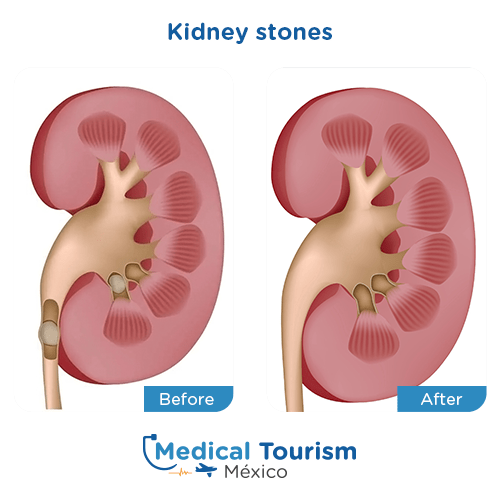The most reliable doctors in Mexico
Kidney stones information and locations in Mexico
Kidney stones are formed inside the kidneys or along the urinary tract. These stones are hard
deposits made of calcium, oxalate, or uric acid. Dehydration, diet, obesity, or medical
conditions can increase the risk of kidney stones.
Some people may never notice that they have had a kidney stone, while larger stones can be very
painful to pass through the urinary tract, causing blood in the urine, nausea, and vomiting, or
pain in the lower abdomen. The type of treatment will depend if it’s blocking the urinary tract,
the type of stone, and its size.
The most common treatments for kidney stones are:
Shock wave lithotripsy - (SWL)
The urologist uses shock wave lithotripsy to break down the stones into stone dust,
breaking them into smaller pieces so they can pass through the urinary tract. This
treatment is effective in stones that are 4 mm and 2 cm in diameter.
Ureteroscopy and cystoscopy
The urologist inserts a cystoscope, a thin cable-looking device that can help the doctor
look and find stones inside the urethra and bladder. The ureteroscope provides clear
images of the kidneys and ureters. The doctor removes or breaks the stone into small
pieces so it can then pass through the urine.
Benefits
Treatment can help alleviate pain
Reduces the risk of infection
Can prevent more serious complications
Reduces the risk of infection
Can prevent more serious complications
Kidney stones
Procedure:
2 -3 hrs.
Hospital stay: 20 - 45 min.
Cleared to fly: 1 day
Hospital stay: 20 - 45 min.
Cleared to fly: 1 day
After surgery
Out of town patients do not require follow-ups with the urologist after the procedure. Patients are clear to fly on
the same day of kidney stones surgery.
Note: Follow-ups can be arranged as face-to-face or virtually. If needed, you can go to your primary care physician to remove sutures or get medication adjustments.
As an Amazon Associate, we earn from qualifying purchases.
Take a look at one of our medical tourism essentials for urology surgery.
Take a look at one of our medical tourism essentials for urology surgery.
Before and after images
View additional images for this procedure.

View more


Locations
Select the city of your choice to seethe doctors profile.
Cancún, Q. Roo.
Dr. Rodrigo González
View more

Kidney stones frequent questions
Get answers to our most frequently asked questions.
How do kidney stones form?
Kidney stones are caused when there are high levels of calcium, oxalate, and phosphorus in the urine.
How can I prevent getting kidney stones?
Drinking water regularly and reducing the amount of salt in foods are some of the recommendations. If you have a history of kidneys stones talk to a doctor.
Recent news
Article
300 kidney stones found in a woman in taiwan due to drinking boba tea
Doctores Especialistas on March 21, 2025

Disclaimer: This information does not reflect the medical advice from our clinics. All cases are different and this treatment may not suit you. Always refer to a medical professional with the certification and experience. All of our physicians are fully qualified to perform these procedures. For more information and diagnosis contact one of our top specialized clinics.
In all medical procedures, there are chances of complications, the specialist will provide you detailed information about the risks of the procedure, talk to the specialist directly.
In all medical procedures, there are chances of complications, the specialist will provide you detailed information about the risks of the procedure, talk to the specialist directly.





